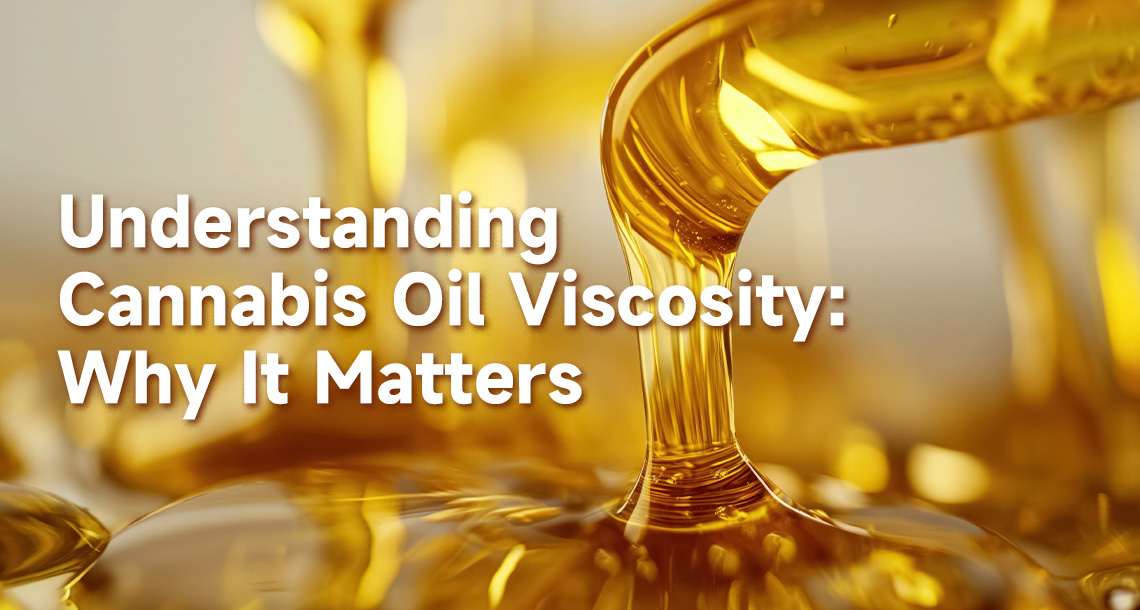
How to Mask Cannabis Smell: Effective Strategies for Discreet Use
July 25, 2024
How to Mask Cannabis Smell: Effective Strategies for Discreet Use
July 25, 2024
Understanding Cannabis Oil Viscosity: Why It Matters
Cannabis oil, a popular product in the world of wellness and medicinal use, has a variety of properties that affect its quality and usability. One of the key factors is its viscosity. But what exactly is viscosity, and why does it matter when it comes to cannabis oil?
What is Viscosity?
Viscosity refers to the thickness or flowability of a liquid. In simple terms, it measures how easily a liquid flows. For instance, water has low viscosity as it flows easily, while honey has high viscosity because it’s thicker and flows more slowly.
Why Viscosity Matters in Cannabis Oil
- Consistency and Potency: The viscosity of cannabis oil can affect its consistency and how it interacts with other ingredients in products. Oils with higher viscosity are often more concentrated, meaning they can contain higher levels of cannabinoids like THC and CBD. This can lead to a more potent product, which is important for both medicinal and recreational users seeking specific effects.
- Device Compatibility: The viscosity of cannabis oil is crucial for those who use it in vaporizers or vape pens. Oils that are too thick may not work well with certain devices, leading to clogging or uneven vaporization. Conversely, oils that are too thin may leak or not vaporize properly, leading to wastage and an unsatisfactory experience. Manufacturers often modify the viscosity of cannabis oil to ensure it works optimally with different types of vape devices.
- Shelf Life and Stability: Viscosity also plays a role in the shelf life and stability of cannabis oil. Thicker oils tend to be more stable over time, resisting separation and maintaining their potency. This is particularly important for long-term storage or for products that are used over extended periods.
- Dosage Accuracy: For medical cannabis users, accurate dosing is critical. Viscosity affects how cannabis oil is dispensed, whether it’s through a dropper, syringe, or vape cartridge. Oils with consistent viscosity ensure that each dose contains the same concentration of active ingredients, which is vital for achieving the desired therapeutic effects.
Factors Affecting Cannabis Oil Viscosity
- Cannabinoid Concentration: Higher concentrations of cannabinoids generally increase the viscosity of cannabis oil. THC and CBD, the primary cannabinoids, are naturally thick and sticky, so oils rich in these compounds will have higher viscosity.
- Terpene Content: Terpenes, the aromatic compounds in cannabis, can significantly affect viscosity. Some terpenes are more fluid and can reduce the viscosity of the oil, making it thinner. This is why full-spectrum cannabis oils, which contain a wide range of terpenes, often have varying viscosities.
- Temperature: Like many substances, the viscosity of cannabis oil changes with temperature. When heated, the oil becomes thinner and flows more easily, which is why vape pens heat the oil before inhalation. Conversely, colder temperatures increase viscosity, making the oil thicker.
- Additives and Carriers: Some cannabis oils include additives or carrier oils, such as MCT oil or vegetable glycerin, to modify viscosity. These ingredients can make the oil thinner and more suitable for specific applications, like vaping or edibles.
Choosing the Right Cannabis Oil
When selecting cannabis oil, it’s important to consider its intended use. For vaping, a lower viscosity oil might be preferable to ensure smooth operation of the device. For tinctures or topical applications, a thicker oil may be more suitable due to its stability and potency.
Conclusion
Viscosity is a critical aspect of cannabis oil that influences its usability, potency, and effectiveness. Understanding how viscosity works and what factors affect it can help consumers make informed decisions when purchasing and using cannabis oil, ensuring they get the most out of their product. Whether you’re a recreational user or someone using cannabis for medicinal purposes, paying attention to viscosity will enhance your overall experience.